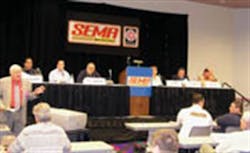No two independent tire dealers are alike, but many of the problems they face are similar. For the last several years at the SEMA Show, the Tire Industry Association has given dealers a forum to talk about common issues through its “Successful Tire Dealers Share Their Secrets” panel discussions.
This year’s panelists represented a veritable “who’s who” of tire retailing and wholesaling. The first day’s session included A.J. Faught, Northwest Tire & Service, Flint. Mich.; David Hazelton, Jim Paris Tire Co., Denver, Colo.; Mark Windham, Cedar Park Tire, Cedar Park, Texas; David Fausett, Fausett Tire, Adel, Ga.; and Lou Rachmuth, Tire Pro, LaGrange, Ga. The second day’s session included Jayson Williams, Bill Williams Tire, Moosic, Pa.; Bruce Scher, Scher Tire, Riverside, Calif.; David Whitten, Big O Tire, Pahramp, Nev.; Barbara Briggs, Briggs & Sons Tire, Fayetteville, N.C.; Gary Albright, Becker Tire & Treading, Great Bend, Kan.; and Don Hyman, Hyman Tire, Bolivar, Tenn.
On competing against auto dealerships:
Fausett: You have to buy your tires right and offer your customers what they want.
Hazelton: We’re mostly wholesale, but we have five retail stores. We try to work through our dealers.
Faught: We’ve found that many car dealers aren’t particularly enthusiastic about being in the tire business.
[PAGEBREAK]
On competing with price clubs:
Whitten: They opened a Wal-Mart in my town last May. I was concerned at first, but May was my best month. We emphasize what they don’t do, like high performance stuff.
Briggs: You have to find something you can do that’s unique. And it doesn’t have to be something expensive.
On selling custom wheels:
Williams: It’s not as easy as some people think it is. You have to start by understanding the market. There are so many issues to deal with.
Whitten: I don’t understand the business myself but I have people who do. The wheel business is not easy. You have to be willing to accept the difficulties.
Fausett: Don’t try to stock too many. Try to find someone you can get next-day deliveries from.
Hazelton: Find a local wholesaler you can buy from. You need to keep your inventory as small as possible.
Rachmuth: Wheel styles change every three or four months. The wheel customer is very attuned to the latest styles. You can’t put up 10 or 12 wheels and let them sit for six months.
Hyman: If you work through your supplier and find a person there who is knowledgeable, that guy can steer you in the right direction.
Scher: We went after the light truck wheel business. Our customers see that wheel on a truck, and it’s an easy sell.
On opening a second store:
Fausett: I’ve had two and now I have one. I’m a hands-on person and find it very difficult to turn things over to someone else.
Albright: You better have good people. We bring people up through the organization.
Whitten: You need a business plan and you need to know the market. When we enter a market, we have a market survey telling us what it’s like.
Faught: So goes your manager, so goes your store. We’ve had situations in which we’ve compromised on who was going to run (a store) and we paid each time.
Scher: More isn’t always better. If you have a great thing going and then open that second store, it can be very discouraging.
[PAGEBREAK]
On hiring store managers:
Faught: We hire guys and gals who have aspirations to be a manager. Some have had a background in the tire business and a lot haven’t. We’ve had better success with those who weren’t in the tire business. We’re looking for attitude.
Rachmuth: I never hire new managers because they don’t know our philosophy.
On effective media:
Whitten: It depends on what kind of market you’re in. I don’t think print media is as effective as it used to be. I don’t see many people walking in with ads in their hands anymore.
Briggs: When we personalize our radio ads, it gives us a lot of recognition. You reach a lot of people and they think they know you personally.
Albright: We (work with) the Chamber of Commerce in each town where we have a store. They send flyers out each month, which are very, very effective.
On in-store promotions:
Fausett: I don’t discount my prices too much.
Faught: We don’t rely so much on sales but on direct mail pieces. We’ve noticed a big up-tick from direct mail.
[PAGEBREAK]
On improving a losing store:
Hyman: We go to our employees, all the way down to the tire changers, and ask, “What do you think?”
Albright: If we have one store that isn’t doing as well as the others, I might send the manager to a successful store and (have him) tag along for a day.
On boosting employee productivity:
Faught: Your manager has to have vision for his store.
Rachmuth: I’ve been pushing managers to keep employees busy. I don’t want people standing around.
Windham: Each quarter, we have evaluations and (employees) rate themselves.
On attracting new customers and keeping old ones:
Rachmuth: If you’re going to advertise, make it a deal. I’ve tried mail-outs to current customers. The last one I did surprised me; we mailed out a $5 bill to say ‘thanks’ and they could use it for any service. It worked out well because it was a real deal.
Fausett: Don’t advertise if you’re the highest. Why tell someone you’re higher than everybody else?



